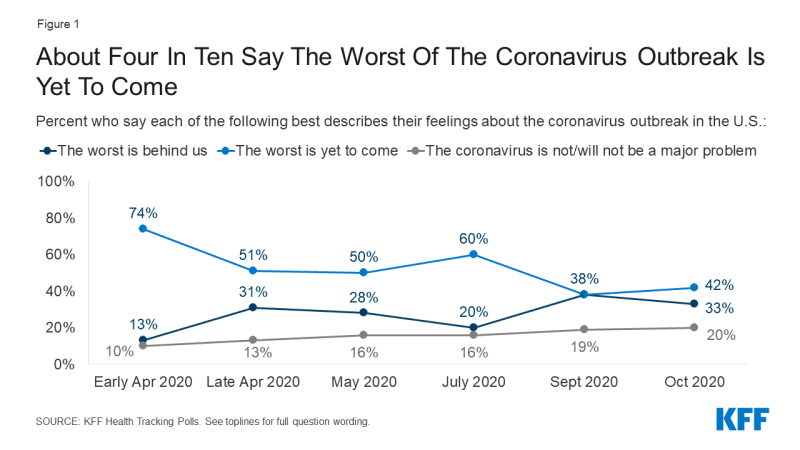KFF Health Tracking Poll – October 2020: The Future of the ACA and Biden’s Advantage On Health Care
These additional findings were released October 20.
Key Findings
- With more than 200,000 Americans dead from the coronavirus and with cases rising in many parts of the country, about two-thirds of adults (66%) say they are worried that they or someone in their family will get sick from coronavirus, an increase of 13 percentage points since early April. The share of Democrats who say they are worried about themselves or someone in their family getting sick from coronavirus has increased by 31 percentage points since April, while the share of Republicans expressing this worry has remained about the same.
- Following President Trump’s coronavirus diagnosis, about three in ten adults say the President’s recent diagnosis makes them more likely to practice social distancing or to wear face masks. Most Republican voters say the President’s diagnosis does not impact their likelihood to vote for him.
- Majorities of the public think President Trump is intervening with the FDA’s and CDC’s coronavirus related work. While most say they have at least a fair amount of trust in the FDA to ensure that an approved coronavirus vaccine is safe and effective (71%) and trust in the CDC to issue coronavirus related guidelines based on scientific evidence (72%), only about three in ten say they have a great deal of trust in these agencies.
Coronavirus Outbreak in the U.S.
The latest KFF Health Tracking Poll, conducted after President Trump contracted COVID-19 and was treated and then released from Walter Reed Army Hospital, finds in the wake of these recent events a sizeable share of the public feel negatively about the status of the coronavirus outbreak in the U.S., and are increasingly worried about themselves or someone in their family getting sick.
About four in ten adults (42%) think the worst of the coronavirus outbreak is yet to come, while a third of adults say the worst is behind us (33%) and one in five say they don’t think coronavirus is a major problem in the U.S. In September, equal shares said the worst of the outbreak is yet to come as said that the worst was behind us (38% each).
Among partisans, a majority of Democrats (64%) say the worst is yet to come, while most Republicans (58%) say the worst is behind us and 23% say the virus is not a major problem. Independents are more likely to say the worst of coronavirus is yet to come (46%) than to say that the worst is behind us (30%). Notably, about half of women (49%) say the worst of the outbreak is yet to come compared to about a third of men (36%) who say the same.
With more than seven million coronavirus cases in the U.S. and more than 200,000 death, two-thirds of adults say they are “very worried” or “somewhat worried” that they or someone in their family will get sick from coronavirus. The share of adults who say they are worried they or a family member will get sick has increased by 13 percentage points, from 53% in April. Mirroring the difference in expectations of what is yet to come in the coronavirus outbreak, women are more likely than men to say they are worried that they or a family member will get sick from coronavirus (73% vs. 58%).
Among partisans, twice as many Democrats as Republicans say they are worried that they or a family member will get sick from coronavirus (87% vs. 42%). Indeed, 53% of Democrats say they are “very worried”. Among independents, two-thirds (66%) say they are at least somewhat worried that they or a family member will get sick from coronavirus.
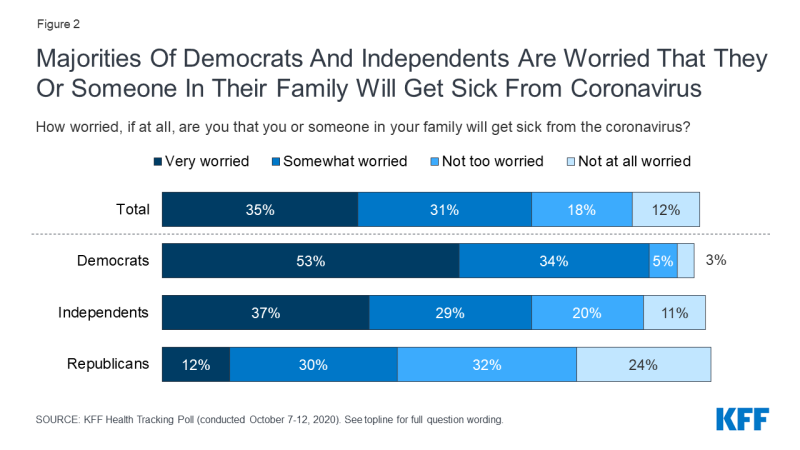
Figure 2: Majorities Of Democrats And Independents Are Worried That They Or Someone In Their Family Will Get Sick From Coronavirus
Since we last asked this question in the late April KFF Health Tracking Poll, the share who say they are worried about themselves or someone in their family getting sick from coronavirus has increased by 31 percentage points among Democrats and 12 percentage points among independents, while remaining about the same among Republicans.
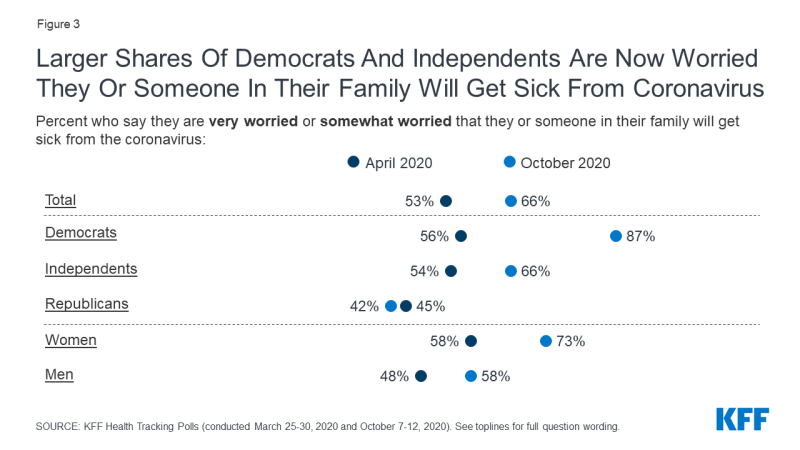
Figure 3: Larger Shares Of Democrats And Independents Are Now Worried They Or Someone In Their Family Will Get Sick From Coronavirus
On Friday, October 1st, President Trump announced that he and the First Lady had tested positive for COVID-19. The President was moved to Walter Reed hospital for treatment and returned to the White House on Monday. Since then, more than a dozen people who had been around the President, including several White House staffers and Republican lawmakers, have recently tested positive for COVID-19.
In the wake of these recent events, about three in ten adults say the President’s coronavirus diagnosis makes them “more likely” to take practice social distancing (31%) and to wear facemasks (31%) while few say it makes them “less likely” to do so.
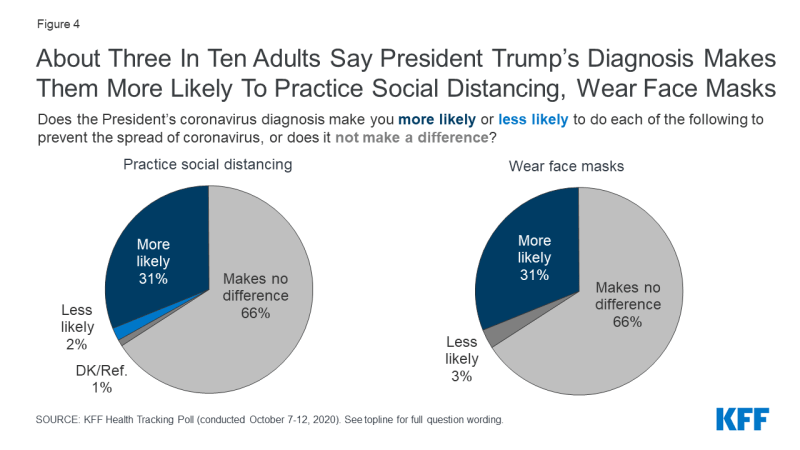
Figure 4: About Three In Ten Adults Say President Trump’s Diagnosis Makes Them More Likely To Practice Social Distancing, Wear Face Masks
Views of social distancing and wearing face masks continue to be partisan, with about twice as many Democrats as Republicans saying President Trump’s diagnosis makes the more likely to practice social distancing (44% vs. 20%) and wear face masks (40% vs. 20%).
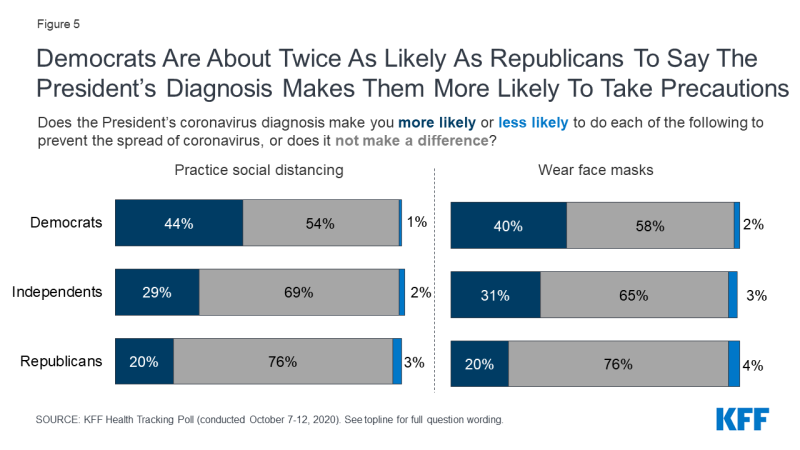
Figure 5: Democrats Are About Twice As Likely As Republicans To Say The President’s Diagnosis Makes Them More Likely To Take Precautions
Few Republican voters say President Trump’s recent coronavirus diagnosis changed the likelihood of them voting for President Trump next month. About nine in ten (88%) Republican voters say it did not make a difference in their vote choice.1
Views Of the FDA and the CDC
Recent reports that President Trump has tried to block recent vaccine guidelines from the U.S. Food and Drug Administration (FDA) have highlighted the role that political considerations may take in the approval of a coronavirus vaccine. Overall, the public trusts the FDA with about seven in ten adults saying they have “a great deal” or “a fair amount” of trust that the FDA will make sure that any coronavirus vaccine is safe and effective before it is approved. This includes majorities of Democrats (77%), Republicans (72%) and independents (64%).
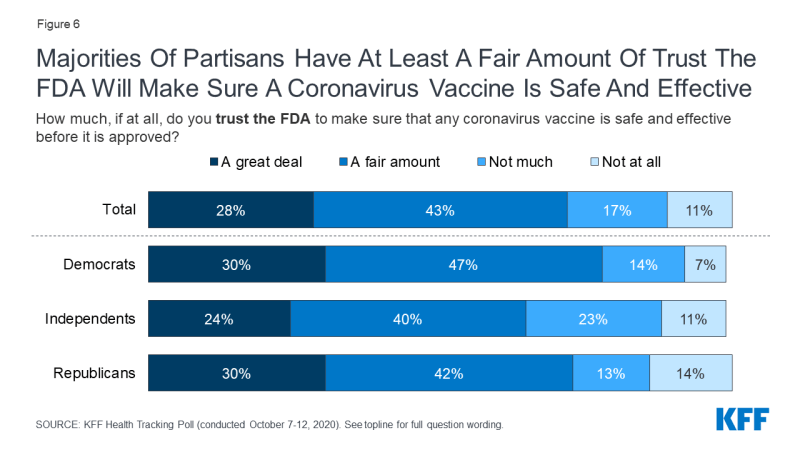
Figure 6: Majorities Of Partisans Have At Least A Fair Amount Of Trust The FDA Will Make Sure A Coronavirus Vaccine Is Safe And Effective
Despite this, many express worry that the FDA will rush to approve a vaccine due to political pressure from President Trump and the White House. About six in ten adults (62%) – including more than eight in ten Democrats and about three in ten Republicans – say they are worried that the FDA will rush to approve a coronavirus vaccine without making sure it is safe and effective, similar to the share who expressed this worry in our September Tracking Poll.
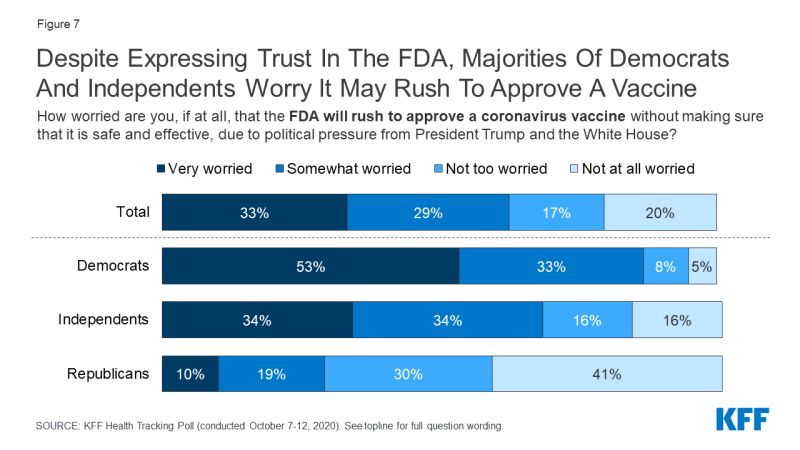
Figure 7: Despite Expressing Trust In The FDA, Majorities Of Democrats And Independents Worry It May Rush To Approve A Vaccine
Along with expressing worry that the FDA may rush to approve a vaccine due to political pressure, a majority of the public (55%) think that President Trump is intervening with the FDA’s job of reviewing and approving a coronavirus vaccine and nearly half (46%) of all adults think his intervention is a bad thing. Few (9%) think President Trump is intervening with the FDA’s reviewing of a coronavirus vaccine and that this is a good thing.
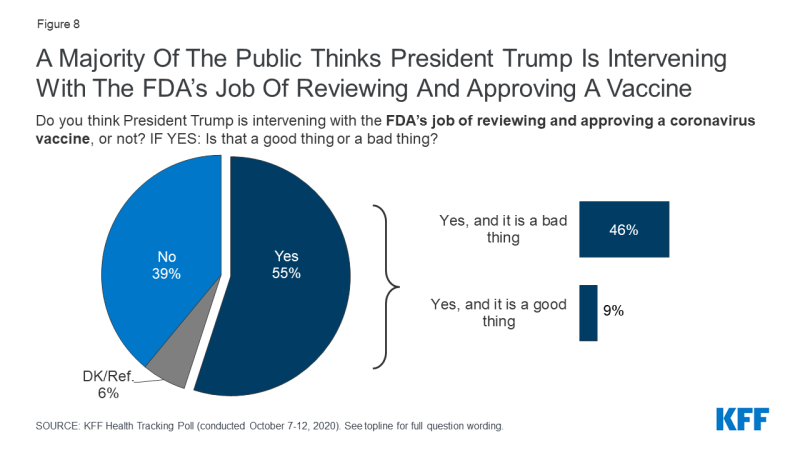
Figure 8: A Majority Of The Public Thinks President Trump Is Intervening With The FDA’s Job Of Reviewing And Approving A Vaccine
About three in four Democrats (77%) think President Trump is intervening with the FDA’s job of reviewing and approving a coronavirus vaccine and that his intervention is a bad thing. On the other hand, about seven in ten Republicans (69%) do not think the President is intervening. Independents are more divided with about half (49%) saying the President is intervening and this is bad, while four in ten (39%) say they do not think the President is intervening with the FDA.
| Table 1: View of President Trump’s intervention with the FDA by party | |||
| Do you think President Trump is intervening with the FDA’s job of reviewing and approving a coronavirus vaccine, or not? | Democrats | Independents | Republicans |
| Yes, and it is a good thing | 4% | 8% | 18% |
| Yes, and it is a bad thing | 77 | 49 | 9 |
| No | 14 | 39 | 69 |
Similar to views of the FDA, the majority of the public trusts the CDC but about half believe that President Trump is intervening with this federal agency. About seven in ten adults (72%) say they have “a great deal” or “a fair amount” of trust that the CDC will issue guidelines and recommendations related to the coronavirus based on scientific evidence. Compared to trust in the FDA, trust in the CDC is somewhat more partisan though majorities of Democrats (84%), independents (72%), and Republicans (60%) say they have at least “a fair amount” of trust that the CDC will issue coronavirus recommendations based on scientific evidence.
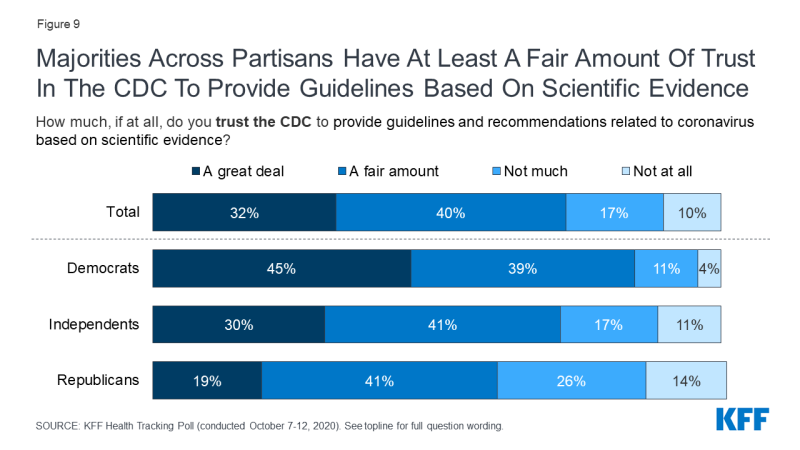
Figure 9: Majorities Across Partisans Have At Least A Fair Amount Of Trust In The CDC To Provide Guidelines Based On Scientific Evidence
There have been recent reports that politically appointed officials in the Department of Health and Human Services have interfered with coronavirus-related CDC reports. Amidst these revelations, a majority of the public (54%) thinks President Trump is intervening with the CDC’s job of issuing guidelines and recommendations related to coronavirus. Moreover, nearly half of the public (47%) believe intervention by President Trump is a bad thing, while 8% say the President is intervening with the CDC’s job and this is a good thing.
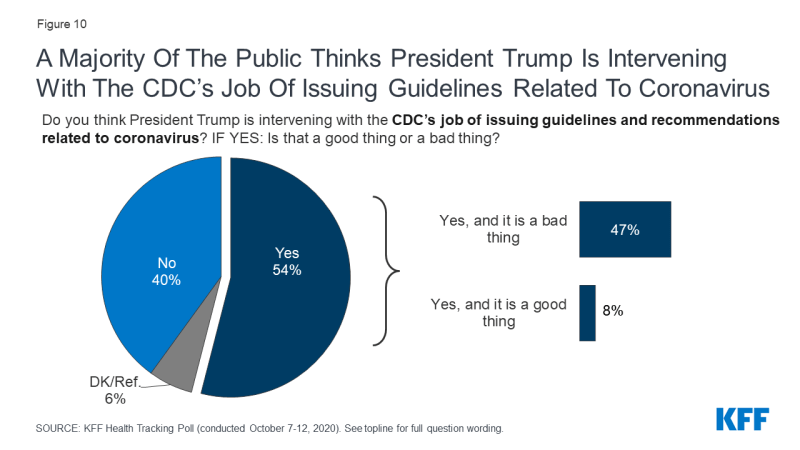
Figure 10: A Majority Of The Public Thinks President Trump Is Intervening With The CDC’s Job Of Issuing Guidelines Related To Coronavirus
Once again, there is a stark partisan divide with about three in four Democrats (77%) saying they think President Trump is intervening with the CDC and that his intervention is a bad thing as do half (51%) of independents. On the other hand, about three in four Republicans (72%) do not think the president is intervening.
| Table 2: View of President Trump’s intervention with the CDC by party | |||
| Do you think President Trump is intervening with the CDC’s job of issuing guidelines and recommendations related to coronavirus? | Democrats | Independents | Republicans |
| Yes, and it is a good thing | 4% | 7% | 14% |
| Yes, and it is a bad thing | 77 | 51 | 10 |
| No | 14 | 37 | 72 |

